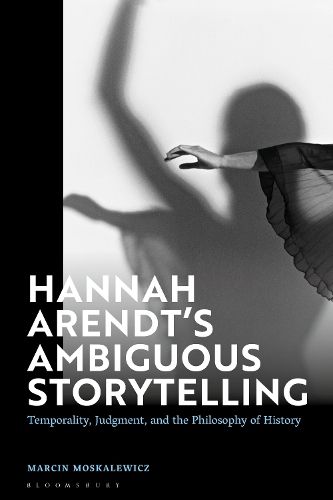Readings Newsletter
Become a Readings Member to make your shopping experience even easier.
Sign in or sign up for free!
You’re not far away from qualifying for FREE standard shipping within Australia
You’ve qualified for FREE standard shipping within Australia
The cart is loading…






Through an original interpretation of Hannah Arendt's historiography, Marcin Moskalewicz reveals an under-acknowledged philosophy of history in her vast and variegated oeuvre, including the historical magnum opus, The Origins of Totalitarianism.
Hannah Arendt's Ambiguous Storytelling argues that the key to understanding the fragmentary thought of Arendt is through the speculative and critical dimensions of the philosophy of history. It unravels the essential aporia of Arendt's thinking - the discrepancy between political and historical meaning of events - and proposes its overcoming through aesthetic historical judgment. Reading her approach as "fragmented historiography", the project she was committed to reveals itself as the only credible methodological response to totalitarianism and scientific approach to history, which both function as a retrospective prophecy, erroneously presenting the past as a forecast of the future.
A novel contribution to Arendt scholarship, this book will appeal to philosophers of history, political scientists and theorists alike.
$9.00 standard shipping within Australia
FREE standard shipping within Australia for orders over $100.00
Express & International shipping calculated at checkout
Through an original interpretation of Hannah Arendt's historiography, Marcin Moskalewicz reveals an under-acknowledged philosophy of history in her vast and variegated oeuvre, including the historical magnum opus, The Origins of Totalitarianism.
Hannah Arendt's Ambiguous Storytelling argues that the key to understanding the fragmentary thought of Arendt is through the speculative and critical dimensions of the philosophy of history. It unravels the essential aporia of Arendt's thinking - the discrepancy between political and historical meaning of events - and proposes its overcoming through aesthetic historical judgment. Reading her approach as "fragmented historiography", the project she was committed to reveals itself as the only credible methodological response to totalitarianism and scientific approach to history, which both function as a retrospective prophecy, erroneously presenting the past as a forecast of the future.
A novel contribution to Arendt scholarship, this book will appeal to philosophers of history, political scientists and theorists alike.